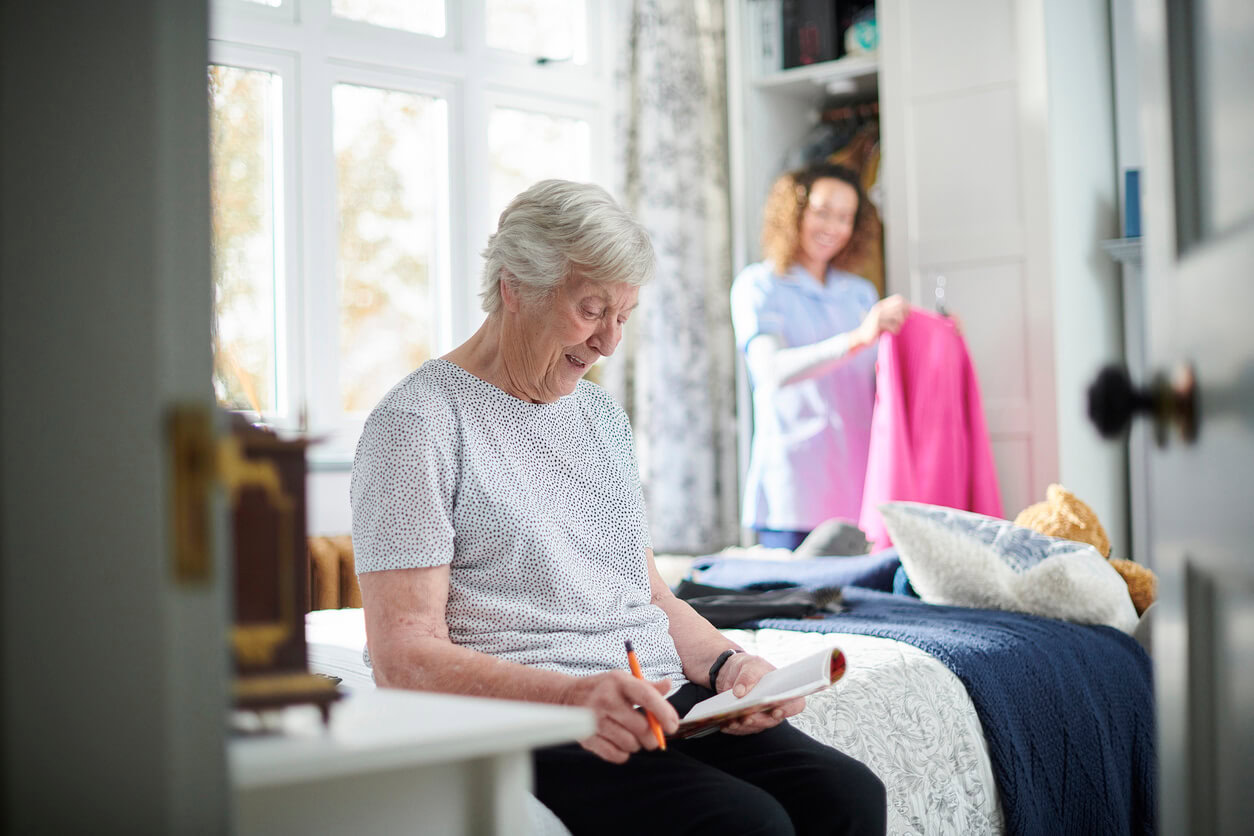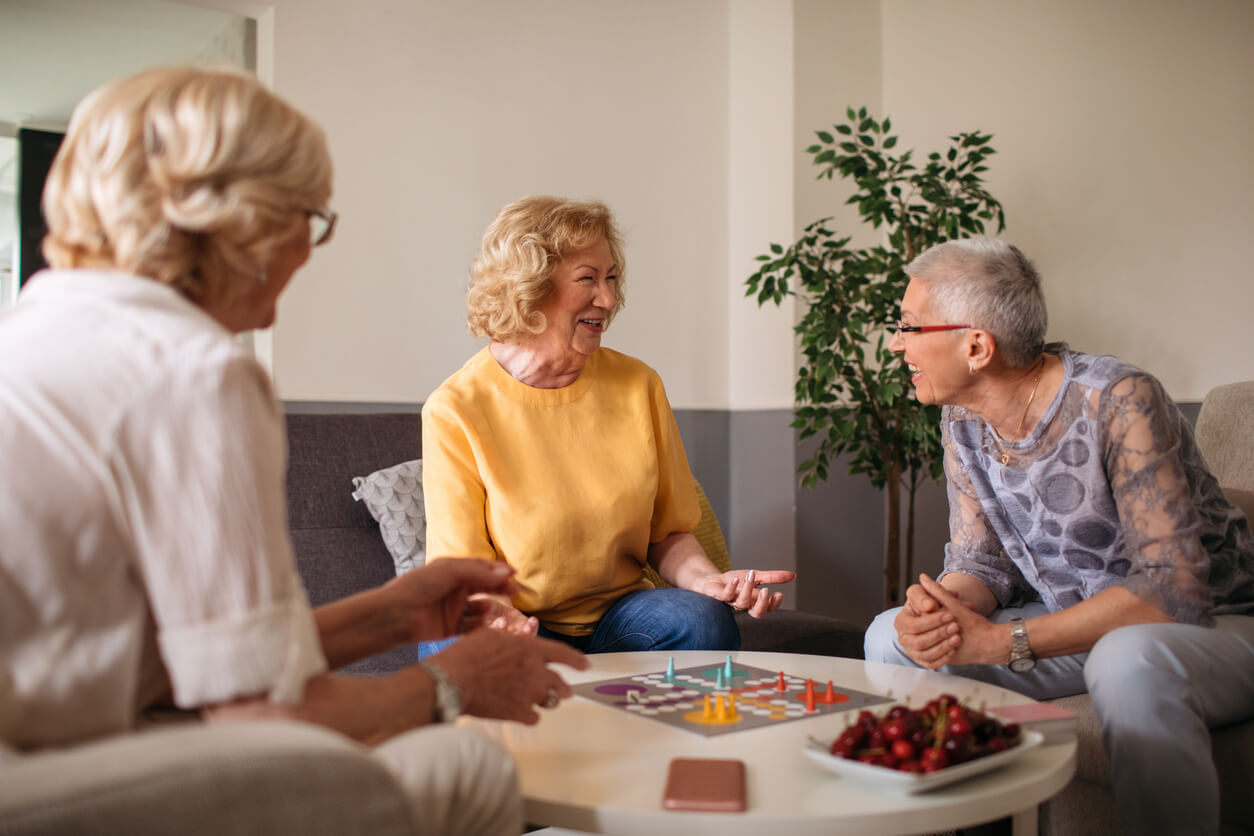5 Ways to Bring Joy and Comfort: Activities for Dementia Patients
- Posted on
- By wpengine

Whether you’re a family member or a caregiver, caring for someone with dementia presents unique challenges. But it also opens doors to a unique opportunity for connection and joy: activities for dementia patients.
Understanding how to engage meaningfully with your loved one can make all the difference. Dementia activities tailored to their abilities and interests can stimulate their senses, evoke cherished memories, and offer connection and comfort, bringing joy and light into their daily lives.
Let’s look at the benefits of these activities for dementia patients and five enriching options that can help maintain emotional connection and enhance your loved one’s quality of life.
A Quick Breakdown of Dementia
Dementia is a general term for the loss of memory, language, problem-solving, and other cognitive skills severe enough to interfere with daily life. It primarily affects older adults and results from a variety of diseases and injuries that primarily or secondarily affect the brain.
When someone has dementia, these cognitive declines progress and gradually affect their ability to manage everyday activities on their own.
The Stages of Dementia
Understanding the stages of dementia can help you understand where your loved one is so you can tailor care and activities to meet their evolving needs. While there are seven medical stages progressing from mild dementia to Alzheimer’s disease, the journey can be categorized into three main phases.
Early Stages
The early stages might go unnoticed because they’re so subtle that they can resemble normal age-related forgetfulness. Individuals may have trouble with complex tasks, lose track of time, or have a hard time following directions in familiar settings. They can still manage personal care and other daily activities, but would benefit from reminders and support in organizing their day.
Middle Stages
More noticeable changes occur as dementia progresses to the middle stage. Memory loss becomes more pronounced and confusion often increases, especially in the evening hours. Individuals may also struggle to find the right words and express their thoughts coherently.
At this stage, memory care assistance becomes necessary for many daily activities, including choosing clothing, taking medication, and managing personal hygiene.
Late Stages
In the late stages of dementia, individuals may require full-time assistance with daily activities and personal care. Cognitive health continues to decline and significantly impacts physical abilities, including:
- Walking
- Sitting
- Swallowing
Emotional expressions and communications may be limited, requiring caregivers to use non-verbal cues and touch to connect and provide comfort. Individuals need significant personal care at this point for daily activities and their physical health.
The Benefits of Activities for Dementia Patients
No matter the stage of dementia, engaging in appropriate activities can profoundly influence the overall quality of life for dementia patients. These activities for dementia patients help them stay connected to their environment and their loved ones in several ways:
- Enhance cognitive function: Activities like puzzles, memory games, and simple problem-solving tasks can help slow cognitive decline by stimulating the brain. Regular mental exercises are crucial to help your loved one maintain as much brain function as possible.
- Reduce anxiety and depression: Engaging in meaningful, suitable activities can provide comfort and pleasure, which help reduce feelings of anxiety and depression. Activities that trigger memories of past hobbies or interests can be particularly effective.
- Promote physical health: Physical activities like gentle walks, stretching exercises, or light gardening work can help dementia patients maintain mobility and balance. This is important for their overall health and reducing the risk of falls.
- Improve social interaction: Group activities can help your loved one maintain social skills and provide valuable opportunities for social interactions. Even simple conversations or shared tasks can make a significant difference in their emotional well-being.
- Provide a structured routine: Dementia patients often feel confused or disoriented. A consistent schedule of activities can create structure and a sense of normalcy and security that can be comforting.
Incorporating these types of engaging activities into the daily life of someone with dementia can significantly enhance their overall well-being and make each day more enjoyable and fulfilling for them and their caregivers.
5 Activities for Dementia Patients That Bring Joy and Comfort
Planning activities that bring joy and comfort to dementia patients is a powerful way to enhance their daily living experience and quality of life. Consider five engaging and fun activities that have been proven to be effective in maintaining mental engagement, physical health, and emotional well-being.
1. Looking at Family Photo Albums
Looking at family photo albums together is a deeply personal and emotionally stimulating activity that for dementia patients. You can easily tailor it to fit any stage of dementia, providing a powerful connection to each individual’s personal history and identity.
Start by choosing a photo album with clear and recognizable photos of people, palace, or events significant to your loved one. Sit together in a quiet, comfortable space and gently guide them through the album, letting them take the lead in navigating through the memories.
As you go through the photos, encourage conversation by pointing out familiar faces and recalling the stories behind the pictures. Even if your loved one may not remember specific details, the faces and images can trigger comforting emotional memories and nostalgia feelings.
This activity aids in cognitive stimulation by jogging memory and helps maintain emotional connections with you and their personal history. It’s a gentle way to engage and soothe, making it especially valuable for those in later stages of dementia who struggle with verbal communication.
2. Listening to Their Favorite Songs
Music is a powerful way to tap into our deepest memories, and listening to favorite songs can be immensely comforting and invigorating for dementia patients. To incorporate this into daily routines, you can create a playlist of songs that were popular in their younger years, holiday songs, or tracks you know they’ve enjoyed in the past.
Play the music during different parts of the day, such as:
- During meals
- During relaxation times
- When they feel agitated
Singing along or even gently swaying to the music can boost engagement. Additionally, discussing the music and any memories it might stir can be a stimulating cognitive activity and promote connection.
Listening to your loved one’s favorite songs helps to reduce stress and anxiety, facilitates positive changes in mood and behavior, and provide moments of joy and a temporary retreat from the challenges of daily life with dementia.

3. Playing Board Games
Board games can be an excellent cognitive exercise for dementia patients because they stimulate strategic thinking and temporary recall.
Choosing simpler, familiar games helps keep the activity enjoyable and not overwhelming. Classic games like checkers, bingo, or card games that require matching colors or shapes like Uno offer an opportunity for light-hearted social interaction.
When playing the games, focus on the process of playing rather than the outcome. Encourage participation in a relaxed, non-competitive atmosphere to minimize frustration.
These games can help enhance decision-making skills and attention to detail while providing a sense of joy and accomplishment. They’re also a wonderful way to engage multiple family members or residents in a senior living community for shared fun and a sense of community.
4. Taking Outdoor Excursions
Outdoor excursions can be highly beneficial for dementia patients, offering fresh air, a change of scenery, and the chance for gentle physical activity. Being in nature can significantly improve mood and overall well-being. The sensory stimulation from seeing different colors, smelling various scents, and feeling different textures can also help maintain sensory awareness.
Some excursions you can take include:
- A walk in a nearby park
- A visit to a dog park
- A visit to the community garden
- Sitting outside together
- Doing gentle exercises together
Choose locations that are safe and familiar to your loved one, making sure the environment isn’t overly stimulating or crowded. Keep the outings brief and monitor their comfort level continuously to make sure they don’t feel overwhelmed or uncomfortable.
You can adapt your outdoor excursion to your loved one’s mobility and energy levels, even if that just means sitting on a quiet patio at their residential care home for a few minutes. This activity promotes physical health through exercise, reduces feelings of confinement, and provides a sense of freedom and normalcy—all important aspects of emotional health in dementia patients.
5. Playing Puzzle Games
Puzzle games offer engaging ways to stimulate cognitive functions in dementia patients. They can help sharpen focus and problem-sovling skills while providing a sense of satisfaction upon completion. Some options include:
- Jigsaw puzzles
- Crossword puzzles
- Word search
- Sudoku
It’s important to choose puzzles suited to the person’s current abilities. For example, jigsaw puzzles with larger, fewer pieces may be better for those in the later stages of dementia, whereas crossword puzzles can be more stimulating for those at an earlier stage.
Setting up a comfortable and well-lit space for puzzle activities can make the process more enjoyable. You can also turn it into a shared activity that enhances social interaction by helping them find pieces or solve clues.
The tactile nature of handling puzzle pieces and the mental challenge of fitting them together or solving clues can provide a balanced stimulation that’s both rewarding and comforting. These games keep the mind active and give your loved one a sense of control and personal achievement, which are important for maintaining morale and self-esteem in dementia patients.
Bring Your Loved One Joy and Comfort with Mira Vie
Incorporating these five fun activities for dementia patients into their daily lives can significantly enhance their overall well-being and maintain social connections, bringing them joy, comfort, and a sense of accomplishment.
At Mira Vie, we’re dedicated to providing a supportive environment where your loved ones can thrive, surrounded by care and comfort. We enhance the lives of our residents with dementia through our compassionate care and thoughtful senior living options, including Assisted Living, Memory Care, and Respite Care.
Contact us today to discover how we can enrich your loved one’s life together, giving them the dignity and joy they deserve.
Related Articles

Mira Vie at Manalapan Earns 2025 AHCA/NCAL Bronze National Quality Award
Manalapan, New Jersey – Mira Vie at Manalapan has been recognized as a 2025 recipient
